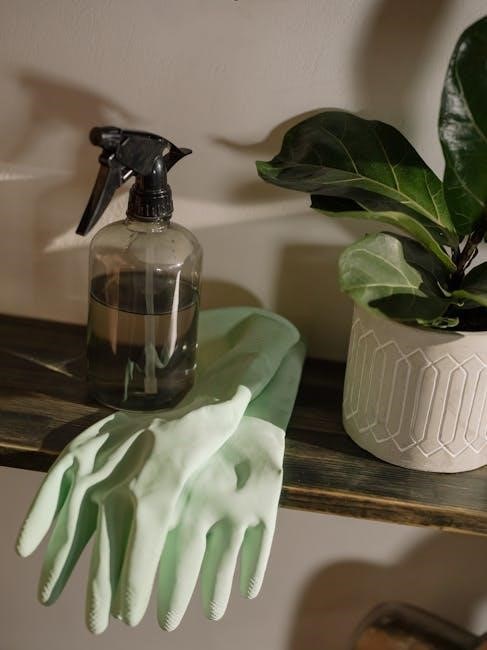the clean house sarah ruhl pdf
- Published
- in PDF
Sarah Ruhl’s The Clean House is a captivating play blending humor, romance, and magical realism. Premiering in 2004, it won the Susan Smith Blackburn Prize, acclaiming its unique storytelling and emotional depth. The play explores themes of love, loss, and identity through a quirky narrative, making it a standout in contemporary theatre.
Overview of the Play and Its Significance
The Clean House by Sarah Ruhl is a poignant blend of magical realism and humor, exploring themes of love, loss, and identity. Premiering at Yale Repertory Theatre in 2004, it earned the Susan Smith Blackburn Prize and was a Pulitzer Prize finalist. The play follows Matilde, a Brazilian maid, and her complex relationships with her employers, delving into the emotional and psychological layers of cleanliness, both literal and metaphorical. Its unique narrative style and ability to merge the supernatural with everyday life have made it a significant work in contemporary American theatre, praised for its originality and emotional depth.

The Playwright: Sarah Ruhl
Sarah Ruhl is a celebrated American playwright known for works like Eurydice and In the Next Room. Her unique style blends magical realism with emotional depth, earning her the Susan Smith Blackburn Prize and Pulitzer finalist recognition.
Background and Contributions to American Theatre
Sarah Ruhl, a prominent American playwright, has significantly influenced contemporary theatre with her unique voice and imaginative storytelling. Born in 1974, Ruhl developed a passion for theatre early in her academic career. Her plays, such as The Clean House, Eurydice, and In the Next Room, blend magical realism with emotional depth, offering fresh perspectives on love, loss, and identity. Ruhl’s work has been widely acclaimed, earning her the Susan Smith Blackburn Prize and a Pulitzer Prize finalist recognition. Her contributions have enriched American theatre, making her one of the most celebrated playwrights of her generation, with productions staged at major theatres nationwide.

Plot Summary
The Clean House follows Matilde, a Brazilian maid who dislikes cleaning, and her complex relationship with her employer Lane. The story intertwines humor, romance, and existential themes, exploring love, loss, and identity through a unique blend of magical realism and everyday life, as Matilde navigates her emotional journey and unexpected connections.
Key Themes and Character Dynamics
The play delves into themes of love, loss, identity, and the complexities of human relationships. Matilde, a Brazilian maid, embodies the struggle between duty and personal aspirations, while Lane, her employer, grapples with emotional detachment. Virginia, Lane’s sister, finds solace in cleaning, reflecting her own inner turmoil. The arrival of Charles, Lane’s husband, and his unconventional relationship with Matilde further complicates the dynamics. Through these characters, Ruhl explores how individuals navigate their desires, grief, and sense of self. The interplay of humor and pathos highlights the fragility and resilience of human connections, making the play a poignant exploration of contemporary life.

Magical Realism in “The Clean House”
Magical realism seamlessly merges the supernatural with everyday life, creating a unique narrative style. Matilde’s humorous yet poignant journey exemplifies Ruhl’s ability to infuse the ordinary with the extraordinary, enriching the play’s emotional depth and thematic exploration.
Blending the Supernatural with Everyday Life
In The Clean House, magical realism transcends traditional storytelling by intertwining the mundane with the fantastical. Matilde, a Brazilian maid who dislikes cleaning, finds solace in her humorous yet poignant imagination, where the ordinary act of cleaning becomes a metaphor for emotional cleansing. The play subtly introduces supernatural elements, like the appearance of Matilde’s eccentric sister, creating a whimsical yet relatable world. This blend allows Ruhl to explore deeper themes of identity, loss, and love, making the extraordinary feel natural. The result is a narrative that resonates emotionally while maintaining a light-hearted and humorous tone throughout.

Themes and Motifs
The play explores themes of love, loss, and identity, intertwined with magical realism. Cleaning symbolizes emotional cleansing, while humor and whimsy highlight the complexity of human connections.

Exploring Love, Loss, and Identity
The Clean House delves into universal themes of love, loss, and identity, weaving them with humor and magical realism. Matilde, a Brazilian maid, embodies the struggle to find purpose beyond her duties, while Lane, her employer, grapples with marital discontent. Virginia, Lane’s sister, seeks fulfillment through cleaning, symbolizing emotional cleansing. Charles, Lane’s husband, introduces a twist with his unexpected love for another woman. The play balances whimsy with profound introspection, exploring how love and loss reshape identity. Through its unique narrative, Ruhl examines how characters navigate grief, joy, and self-discovery, blending the supernatural with everyday life to highlight the complexity of human experience.

Characters Analysis
Matilde, the Brazilian maid, embodies existential angst and quiet resilience. Lane, her employer, struggles with perfectionism and marital dissatisfaction. Virginia finds solace in cleaning, while Charles pursues unconventional love, reshaping identities and relationships.
Matilde, Lane, Virginia, and Charles
Matilde, a Brazilian maid, grapples with her aversion to cleaning, reflecting deeper existential struggles. Lane, her employer, is a surgeon consumed by marital dissatisfaction and control. Virginia, Lane’s sister, finds peculiar comfort in cleaning, offering a quirky counterpoint. Charles, Lane’s husband, unexpectedly leaves her for a younger woman, disrupting the household’s balance. Through their interactions, Ruhl crafts a nuanced exploration of love, loss, and identity, blending humor with poignancy. Each character’s journey intertwines, revealing the complexities of human relationships and the search for meaning in everyday life. Their dynamics drive the play’s emotional core, making them unforgettable.

Reception and Awards
The Clean House won the 2004 Susan Smith Blackburn Prize and was a finalist for the 2005 Pulitzer Prize for Drama, earning widespread critical acclaim and praise for its unique storytelling and emotional depth. The play received positive reviews for its blend of humor, magical realism, and poignant themes, solidifying Sarah Ruhl’s reputation as a prominent voice in contemporary theatre. Its success led to extended runs in major theatres, including Off-Broadway productions and national tours.
Critical Acclaim and Notable Recognitions
The Clean House garnered widespread critical acclaim for its unique blend of humor, magical realism, and emotional depth. The play won the prestigious Susan Smith Blackburn Prize in 2004 and was a finalist for the 2005 Pulitzer Prize for Drama. Critics praised Sarah Ruhl’s lyrical prose and innovative storytelling, with The New York Times highlighting its “whimsical yet profound exploration of love and loss.” Audiences and reviewers alike celebrated its fresh take on romantic comedy, solidifying its place as a modern theatrical masterpiece. The play’s success led to extended runs and national tours, further cementing its reputation.

The Play’s Style and Structure
Sarah Ruhl’s The Clean House employs magical realism, blending humor with emotional depth. Its non-linear narrative and poetic dialogue create a unique, dreamlike atmosphere, balancing whimsy and heartache seamlessly.
Unique Narrative Techniques
Ruhl’s The Clean House employs a non-linear narrative, intertwining reality and fantasy. The play’s structure shifts seamlessly between present and past, using poetic dialogue and surreal imagery. Magical realism is central, with elements like flying cleaning supplies and a Brazilian cleaning woman’s anecdotes enriching the story. Ruhl’s use of language is lyrical, creating a dreamlike atmosphere that balances humor and emotional depth. This unique approach keeps audiences engaged, exploring themes of love, loss, and identity through unconventional storytelling. The play’s innovative techniques have been praised for their originality and emotional resonance, making it a standout in contemporary theatre.

Availability and Adaptations
Sarah Ruhl’s The Clean House is widely available as a PDF through publishers like Samuel French. Notable stage adaptations include productions at Yale Repertory Theatre and Goodman Theatre.
Publishing Formats and Stage Productions
The Clean House by Sarah Ruhl is available in various formats, including print and PDF through publishers like Samuel French. The play premiered at Yale Repertory Theatre in 2004, directed by Bill Rauch, and later opened Off-Broadway at Lincoln Center Theatre. Notable productions include the Goodman Theatre in Chicago, featuring designs by Todd Rosenthal and Linda Roethke. Its success led to adaptations across major theatres, solidifying its place in contemporary American drama. The play’s unique style and magical realism have made it a favorite for both readers and audiences, ensuring its continued relevance and appeal.
